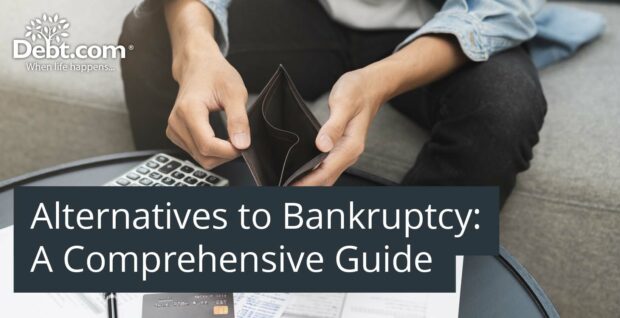
Table of Contents
Bankruptcy is a legal option to absolve responsibility for your debts – but not everyone qualifies.
Dealing with crippling debt can be incredibly painful and frustrating. For many, bankruptcy seems like the only way out, offering the hope of a fresh start. However, filing for bankruptcy isn’t always easy, and not everyone qualifies. There are specific requirements you need to meet, and it’s possible for your bankruptcy application to be denied. Understanding what disqualifies you from filing for bankruptcy and knowing the eligibility criteria is crucial before taking this major financial step. Credit counseling can also help ensure you’re making the best decision for your financial situation, providing guidance on whether bankruptcy is truly the right solution.
Filing for bankruptcy is a legal process that allows individuals or businesses to either eliminate or reorganize their debts with the help of the federal court. In 2005, the Bankruptcy Abuse Prevention and Consumer Protection Act (BAPCPA) was introduced to make bankruptcy rules stricter and prevent abuse of the system. These changes were designed to ensure that only those who genuinely need financial help can qualify for chapter 7 or chapter 13 bankruptcy.
It’s essential to understand the difference between secured and unsecured debt, as this distinction will determine what happens to your assets, such as your house or car. Moreover, filing for bankruptcy will have a significant, long-lasting impact on your credit score and financial health.
If you are wondering, can bankruptcy be denied? Or are bankruptcy filings ever denied? It’s important to understand the circumstances that led to these outcomes. Whether you’re filing chapter 7 or chapter 13, not all bankruptcies get approved, and various disqualifying factors can result in rejection.
Eligible debts are either erased or restructured depending on the type of bankruptcy. However, not all bankruptcies are approved. Specific errors or failure to meet requirements can lead to a case being denied, which leaves you grappling with the same debts.
This article addresses common concerns, such as whether chapter 7 can be denied. And what happens if bankruptcy is not discharged? Filing for bankruptcy is often seen as a last resort, but it can relieve those overwhelmed by debt. However, navigating the process can be complex, and being well-informed is critical to avoid any surprises. There are two primary forms of personal bankruptcy — chapter 7 and chapter 13 — and understanding which one suits your situation is key. The following sections will explore the reasons for disqualification, eligibility requirements, the role of credit counseling, and what happens if your bankruptcy application is denied.
What Percentage of Bankruptcies Are Denied?
Recent statistics show that approximately 8-10% of chapter 7 bankruptcy cases and around 30% of chapter 13 bankruptcy cases are denied or dismissed. The percentage of denials depends on several factors, including state-specific requirements and the applicant’s financial situation. How often bankruptcy cases are denied also varies depending on the type of bankruptcy filed and how well the applicant complies with procedural rules.
Recent changes in bankruptcy laws, such as the Bankruptcy Abuse Prevention and Consumer Protection Act (BAPCPA) introduced in 2005, have made the process stricter, contributing to higher denial rates. This is particularly noticeable in states like Michigan, where local laws can influence success rates. Economic conditions and court backlogs in states such as Michigan can also affect the outcomes of bankruptcy filings.
Factors Influencing Denial Rates
- Jurisdiction: Bankruptcy laws and requirements can vary significantly by state. For example, how to file bankruptcy chapter 7 in Michigan may differ from other states, where specific regulations like the Iowa bankruptcy means test might apply. Such requirements can significantly affect approval rates. The cost of filing also differs based on the state. For instance, how much does it cost to file bankruptcy in Iowa? Typically, it ranges from $300 to $400, but additional legal fees may apply.
- Economic Conditions: Economic downturns affect bankruptcy filings, often influencing how lenient courts are with approvals. During tough times, how often do bankruptcies get denied can fluctuate, sometimes leading to more favorable rulings if there is high unemployment.
- Attorney Experience: Choosing to file without a lawyer can raise your chances of having your bankruptcy denied. If you’re considering filing bankruptcy in Michigan without an attorney, you risk making errors that may lead to rejection. An experienced attorney can guide you through the complex process, reducing the likelihood of mistakes that might result in a case being denied.
- Chapter-specific Denials: The success of a bankruptcy filing also depends on the type of bankruptcy. Chapter 7 is often denied due to the strict income qualifications, while chapter 13 filings may be rejected if the debtor cannot propose a feasible repayment plan. In cases where chapter 13 is denied, missed payments or poorly planned budgets are usually the cause.
Many believe that filing for bankruptcy guarantees relief from overwhelming debt, but that’s not always the case. Understanding the factors that lead to bankruptcy denied cases is essential to avoid unnecessary disappointment. Whether you’re filing under chapter 7 or chapter 13, knowing the specific eligibility requirements and the importance of having legal representation can significantly affect your chances of approval.
Why Can Bankruptcy Be Denied?
There are several reasons why a bankruptcy case might be denied. Below are some of the most common reasons:
Failure to Complete Paperwork or Court Orders
One of the most common reasons for a bankruptcy case rejection is failure to comply with required procedures, particularly in submitting complete and accurate paperwork on time. Missing deadlines, incomplete documentation, or not submitting necessary forms can lead to a case being dismissed.
Essential documents that need to be submitted include personal identification (e.g., driver’s license, Social Security card), proof of income (e.g., pay stubs, tax returns), debt details (e.g., credit card statements, medical bills), and a credit counseling certificate.
Each document serves a specific purpose in assessing your financial situation. For example, proof of income helps determine your ability to repay debts, while debt details reveal the full scope of your financial obligations. If you do not attend mandatory credit counseling, your bankruptcy application will be denied, underscoring this step’s importance.
Credit counseling can provide valuable insights into other options for debt relief and help prepare you for the bankruptcy process. What disqualifies you from filing chapter 7 can often be as simple as missing paperwork or failing to attend required hearings. Another reason for denial is if a previous bankruptcy case has been dismissed.
Release of a Previous Bankruptcy Case
If you had a prior bankruptcy case that was dismissed, you might not be allowed to refile for a certain period. Common reasons for dismissal include not paying court fees or failing to follow court orders. A chapter 7 dismissed for abuse usually indicates that the court found evidence of dishonest behavior or intentional misuse of the system. If a previous case was dismissed within the past 180 days because of violating a court order or abusing the system, you cannot refile for chapter 7 or chapter 13.
Filing too often can also be seen as abusing the system, which might lead the court to dismiss your case. There are serious consequences to having your case dismissed, including a waiting period before you can refile. This waiting period can range from several months to years, depending on the reason for the dismissal.
Fraudulent Activity
Fraudulent actions are a major reason why bankruptcy cases get denied. Activities such as concealing assets, providing false information, or running up debts without the intent to repay will undoubtedly lead to denial. Bankruptcy fraud chapter 7 can involve hiding valuable items to keep them out of the bankruptcy estate. Examples of fraudulent activity include transferring property to friends for less than its real value, running up debts without intention to pay, or lying about your income and debts. Courts take fraudulent activity very seriously, and if you try to hide assets or transfer them to family members before filing, your bankruptcy case will likely be denied.
It is essential to avoid anything that could be seen as chapter 7 bankruptcy fraud, as it will not only lead to denial but could also result in criminal charges. If you are caught committing fraud, the consequences go beyond having your bankruptcy denied; you could face legal action, fines, or even jail time. Being honest and transparent during the bankruptcy process is the only way to ensure the best possible outcome.
Recent Bankruptcy Filings
If you have recently filed for bankruptcy, there is a mandatory waiting period before you can file again. This depends on whether you previously filed chapter 7 or chapter 13. For instance, these waiting periods determine the number of times you can file bankruptcy in Michigan. Waiting periods between filings are strictly enforced; if you previously filed for chapter 7, you cannot file again for eight years. For chapter 13, the waiting period is six years. If your case was dismissed, you must wait at least 181 days before re-filing.
These waiting periods are meant to prevent people from abusing the bankruptcy system by filing too often and give you time to rebuild your financial situation without court protection. If you attempt to refile too soon, the court will dismiss your case. Knowing these timelines is essential to avoid unnecessary delays and further financial issues.
Income Eligibility
To qualify for chapter 7 bankruptcy, you must pass a means test. This test compares your household income to the median income in your state. If your income is below the median income, you may be able to file for chapter 7. However, if your income is above the median income, you may need to file for chapter 13 instead, which involves a structured repayment plan. Additionally, chapter 13 requires proof of income to show an ability to repay debts under this plan.
Here’s a comparison of the median income limits for Arkansas, Florida, Michigan, and Washington in 2023:
State Median Income
Arkansas $52,775
Florida $67,900
Michigan $69,850
Washington $82,700
As you can see, the median income limit for chapter 7 bankruptcy varies significantly among these four states. Washington has the highest “median income limit,” while Arkansas has the lowest. This means that individuals in Washington must have a higher income to qualify for chapter 7 than those in Arkansas. As of 2023, chapter 7 income limits in Florida are $2000 less than in Michigan.
In community property states like Washington state, your spouse’s income may count toward eligibility even if you’re filing individually. Married couples must disclose the income of both spouses, even if only one person is filing. Failing the means test is a common reason for denial, and it can be complicated. However, if you don’t pass the means test initially, options may still be available, such as reducing your expenses or adjusting your financial situation to meet the requirements.
Additional Considerations
Household Size: The median income limit may be adjusted based on the number of people in your household.
Other Factors: Other factors, such as your expenses and debt load, may also be considered in determining your eligibility for chapter 7 bankruptcy.
Debt Repayment Ability
Under chapter 13, if you have the ability to repay your debts, you may be ineligible for chapter 7. Courts evaluate your ability to repay debts and disposable income to determine your eligibility. For chapter 13, you must show that you have enough disposable income to follow a structured repayment plan. If your total debt exceeds $2,750,000, you may not qualify. You also need to provide proof that you filed federal and state income taxes for the past four years, as the court wants to ensure that you can maintain a steady, reliable income to keep up with the payment plan.
To qualify, you must provide evidence, such as tax returns, demonstrating your inability to pay your debts under chapter 7. If you cannot show that you have sufficient income to make the payments, the court will deny your filing. This repayment ability is crucial, as chapter 13 focuses on creating a realistic plan for managing and paying off your debt.
Exhaustive Disqualification Situations
Certain debts cannot be discharged or eliminated in bankruptcy proceedings, regardless of the bankruptcy chapter you file under. These non-dischargeable debts are typically considered to be more significant or harmful to society, and the court may not allow them to be wiped clean.
Here’s a breakdown of some common types of non-dischargeable debts:
Business Bankruptcy
Certain Professions: Due to regulatory requirements, individuals in professions like stockbrokers or commodity brokers may face restrictions on bankruptcy filings. These professions often involve handling client funds or assets, and bankruptcy can pose risks to these funds.
Business Structures: Sole proprietorships generally have more flexibility in filing for bankruptcy, as they are considered individuals for tax purposes. However, corporations and limited liability companies (LLCs) may need to meet additional criteria, such as filing financial statements or appointing a trustee. These requirements can make filing for bankruptcy more complex and expensive.
Child Support and Alimony
Priority Debts: The court considers these debts a priority and requires payment, even if you file for bankruptcy. The court recognizes the importance of child support and alimony in supporting families and ensuring the well-being of children.
Legal Consequences: Failure to pay child support or alimony can result in severe legal consequences, such as wage garnishment, property seizure, or even incarceration. These penalties are intended to enforce the court’s orders and protect the rights of children and their custodial parents.
Fines and Penalties
Criminal Restitution: Money owed to victims of a crime. This form of compensation for the harm caused is considered a priority debt.
Court-Ordered Fines: Penalties a court imposes for violating a law or court order. These can include traffic tickets, fines for contempt of court, or other legal penalties. Fines are often considered non-dischargeable because they are intended to punish the offender and deter future violations.
Debts Due to Personal Injury
Wrongful Death: Debts arising from a negligent act that resulted in someone’s death. These debts are typically considered non-dischargeable because they involve the loss of human life and can have severe consequences for the affected families.
Intoxicated Driving: Debts related to personal injury caused by driving under the influence of drugs or alcohol. Courts may view these debts as the result of intentional or reckless behavior and may not allow them to be discharged.
Medical Debt
Luxury Procedures: Debts incurred for cosmetic surgery or other non-essential medical procedures may be harder to discharge. These procedures are often considered elective and may not be necessary for maintaining health or well-being.
Recent Debts: Debts incurred shortly before filing for bankruptcy may be subject to closer scrutiny. If the court determines that the debts were incurred in anticipation of filing for bankruptcy, they may be considered non-dischargeable as a fraudulent transfer.
Student Loans
Hardship Discharge: To qualify for a hardship discharge, you must prove that you cannot repay the loan without undue hardship. This is a difficult standard to meet and requires you to demonstrate that you have made a good faith effort to repay the loan and that repayment would impose a severe hardship on you and your dependents.
Tax Debts
Specific Conditions: To discharge tax debts, you may need to meet certain criteria, such as proving that you cannot afford to pay the taxes and that filing for bankruptcy would not harm the government’s ability to collect. These requirements can be challenging to meet, and it’s important to consult with a tax professional or bankruptcy attorney for guidance.
Additional Considerations
- Fraudulent Transfers: If you transferred assets or property to avoid creditors before filing for bankruptcy, these debts may be non-dischargeable. This is known as a fraudulent transfer and is intended to prevent debtors from hiding their assets from creditors.
- Willful and Malicious Injury: Debts resulting from intentional harm to another person or property are generally non-dischargeable. These debts are considered to be morally reprehensible and are not eligible for discharge.
Understanding non-dischargeable debts is crucial when considering bankruptcy. Consulting with a bankruptcy attorney can help you assess your options and determine the best course of action based on your specific circumstances.
Secured Debts and Bankruptcy: Mortgage and Auto Loans
Secured debts, such as mortgage and auto loans, are debts that are backed by collateral, which is an asset that the lender can seize if you default on the loan. In bankruptcy, secured debts are treated differently from unsecured debts.
Mortgage Loans
- Redemption: You can redeem your home by paying off the entire outstanding balance on the mortgage. This option is often challenging, as it requires a significant amount of money.
- Reaffirmation: You can reaffirm your mortgage by agreeing to continue making payments on the loan after bankruptcy. This is a voluntary agreement that must be approved by the court.
- Stripping Liens: In some cases, it may be possible to strip the lien from your home if the home’s value is significantly less than the amount of the mortgage debt. This means that the lender’s claim on the property is reduced, and you may be able to keep the home.
Auto Loans
- Redemption: Similar to mortgage loans, you can redeem your car by paying off the entire outstanding balance on the auto loan.
- Reaffirmation: You can reaffirm your auto loan by agreeing to continue making payments on the loan after bankruptcy.
- Surrender: If you cannot afford to keep the car, you may be able to surrender it to the lender. The lender will then sell the car and apply the proceeds to the loan balance.
Factors Affecting Secured Debt Treatment
- Value of the Collateral: The value of the property securing the loan plays a significant role in determining the treatment of secured debts. If the property’s value is significantly less than the amount of the debt, the lender may be willing to accept a partial payment or surrender the property.
- Your Financial Situation: Your ability to afford the monthly payments on the secured debt will also influence the outcome. If you cannot afford the payments, you may need to surrender the property or negotiate a modification of the loan terms.
- Bankruptcy chapter: The type of bankruptcy you file (chapter 7 or chapter 13) can also affect the treatment of secured debts. Chapter 13 bankruptcy allows you to create a repayment plan that includes payments on secured debts, while chapter 7 bankruptcy may involve surrendering the property to the lender.
Treating secured debts in bankruptcy can be complex, and it’s important to consult with a bankruptcy attorney to understand your options and make informed decisions. An attorney can help you evaluate your financial situation, assess the value of your collateral, and determine the best course of action for your specific circumstances.
Consequences of Filing Disqualified Bankruptcy
If your bankruptcy filing is disqualified, the consequences can be severe:
- Financial Penalties: You may have to pay fines, court fees, and restitution. These additional financial consequences can make it even harder to recover.
- Legal Consequences: If your case is dismissed, you could face criminal charges for fraud, which could result in jail time. Trying to hide assets or falsify documents can lead to serious legal problems that extend beyond your finances.
- Credit Consequences: If your bankruptcy is disqualified, it can damage your credit score for up to ten years, making it difficult to get loans or even secure a job. The impact on your credit report is significant, and lenders will see you as a high-risk borrower. A bankruptcy petition on a credit report can severely impact your credit score, making it difficult to obtain credit or loans for years to come.
- Additional Consequences: Denial of bankruptcy can also lead to employment being denied due to bankruptcy. It could damage your reputation, affect trust, and make securing future employment challenging.
What Happens to Your Debt When You File Bankruptcy?
When you file for bankruptcy, what happens to your debt depends on the type of bankruptcy you file. In a chapter 7 bankruptcy, most of your unsecured debts are discharged, so you no longer have to pay them. However, some debts, like student loans, child support, and recent tax debts, are not discharged and will still be your responsibility. In chapter 13 bankruptcy, you will be placed on a repayment plan determining how much of your debt you must pay back over three to five years. Understanding how bankruptcy will affect your debts can help you decide if filing for bankruptcy is the right choice for you.
What Will the Courts Do if You File Chapter 7 Personal Bankruptcy?
If you file for chapter 7 personal bankruptcy, the court will take several steps to manage your case. First, the court will assign a trustee to review your financial information, including your assets and debts. The trustee’s job is to find any non-exempt assets that can be sold to repay your creditors. The court will also issue an automatic stay, which temporarily stops creditors from trying to collect debts from you. Throughout the process, the court will ensure that all the required forms are completed and that you follow all bankruptcy rules. If everything is done correctly, the court will eventually discharge your eligible debts, providing you with some relief.
What Happens if You Are Approved?
Getting approved for bankruptcy doesn’t mean your debt problems are completely over. Restrictions will still apply, and if you fail to meet your obligations, your case can be dismissed. It’s important to avoid taking on new credit and to stick to your repayment plan. Even after your debts are discharged, you may face challenges, like rebuilding your credit score and managing any debts that weren’t discharged.
Bankruptcy can give you a fresh start, but it comes with conditions. In chapter 13, you must stick to the repayment plan, and you should avoid new debts during this time. If you fail to follow these rules, your case can be dismissed and end up right back where you started.
What Happens if Bankruptcy Is Not Discharged?
If your bankruptcy is not discharged, it means the court did not approve your request to get rid of your debts. This means you will still have to repay those debts in full. Not having your bankruptcy discharged can make it very difficult to get back on track financially, as you won’t get the fresh start you were hoping for. You might need to consider other options, such as debt settlement or negotiating with creditors. There are many reasons why bankruptcy might not be discharged, like missing paperwork, failing to complete required courses, or suspected fraud. Working with a bankruptcy attorney is important in these situations to determine what went wrong and what you can do next.
What Happens if You Are Denied Bankruptcy?
You must manage your debts without bankruptcy protection if your bankruptcy application is denied. This can be very challenging, but there are still options, like exploring debt relief programs or meeting the requirements to refile. Debt consolidation or debt settlement can help you regain financial stability.
Denying bankruptcy can be discouraging, but it doesn’t mean there are no solutions. Working with a credit counselor or financial advisor can help you find a debt relief option that works for you. Whether it’s negotiating with creditors or consolidating debts, there are still ways to take control of your finances.
If your chapter 7 is denied or dismissed, you may be left without protection from creditors. You may still need to negotiate with creditors or face wage garnishment. A non-discharged bankruptcy means that your debts remain, and you must find other solutions to manage them.
Alternative Debt Relief Options
If bankruptcy isn’t an option, consider these alternatives:
- Debt Consolidation: Combine multiple debts into one payment. Debt consolidation can make managing your finances easier and may reduce your overall interest rates.
- Debt Settlement: Negotiate with creditors to reduce the total amount owed. Debt Settlement helps lower your debt, though it might hurt your credit score.
- Negotiation with Creditors: Work directly with creditors to create a manageable payment plan. Many creditors are willing to work with you if they see that you are making an effort to pay off your debts.
- Debt Management Plans: Create a structured plan to pay off your debts. Non-profit credit counseling agencies can help you create a debt management plan that fits your budget and goals.
Are You Considering Filing for Bankruptcy?
If you’re unsure whether you qualify for bankruptcy, it’s a good idea to seek help from a credit counseling agency or a bankruptcy attorney. Professional guidance can help you navigate the process, improve your chances of getting approved, or find an alternative solution for your debt. Bankruptcy can be complicated, but you don’t have to go through it alone.
Bankruptcy attorneys can give you advice tailored to your specific situation. They can help you determine if you qualify, which type of bankruptcy is best for you, and what steps you need to take. Credit counseling agencies can also help you understand your finances and explore all the available options before deciding to file.
FAQ
Filing for chapter 7 bankruptcy can temporarily stop a lawsuit through an automatic stay, but there are exceptions depending on the type of lawsuit. For example, lawsuits involving child support or certain tax obligations may not be stopped. The automatic stay is one of the main benefits of bankruptcy, as it provides immediate relief from creditors and gives you some breathing room to reorganize your finances.
However, it’s important to understand that an automatic stay is not permanent. It only stops collection actions temporarily while the court reviews your bankruptcy case. If your bankruptcy is denied or dismissed, creditors can resume collection efforts, including lawsuits. Working closely with an attorney can help you make the most of the automatic stay and other protections provided by bankruptcy.












